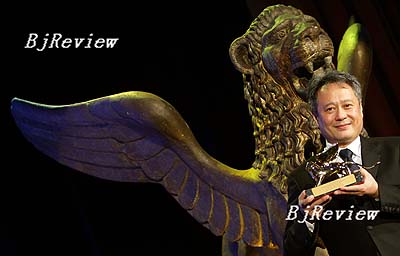|

Caution: Lust Ahead.
If there existed a standardized film rating system (adopted uniformly in every country on the planet), perhaps the above would suffice as adequate warning at the beginning of any film that dared to put more human flesh on display than was deemed polite or necessary. Ang Lee's latest offering, some would say, even begs such a rating.
But by truncating Lust, Caution by over seven minutes, the authorities have proved that censorship merely serves to achieve the opposite -- it yanks the movie, even a mediocre one, out of movie limbo or cult fringes where it might otherwise have languished and places it squarely in the limelight, bestowing a measure of success upon the creation that perhaps even the creator could not have envisioned (also known as the Satanic Verses Syndrome). Who, after all, wouldn't want a peek at what comprised those thirty minutes so worthy of being expunged? Who wouldn't want to know what the media ruckus was all about?
It must be admitted, however, that the scenario also lends itself to movie-like situational comedy. Case in point? The Beijing law student who took on the authority of the State Administration of Radio Film and Television, claiming that the depleted film had infringed on his consumer interests, and demanding $67 for psychological damage caused therewith.
And what of the film itself? Does it merit being hawked gleefully by black-marketeers at subway stations, by urchins doing a better job of hard-sell than perhaps the movie's marketing executives?
The answer is an unconditional yes. Ang Lee, now surely one of the greatest contemporary auteurs of cinema, is on top form again, confounding the few critics who still dare put up a resistance to his art. And resistance, incidentally, is what the film is about -- a band of rebels attempts to thwart the invading enemy, and a young woman, a member of the resistance, puts up a frail, futile resistance to temptations of the heart, as she is drawn into an insidious relationship with the very man she set out to destroy.
Shanghai, 1942. The Japanese have taken over by using the oldest trick in the book -- divide and rule -- splitting the country into rebels and collaborators. The bulk of the movie is told as flashbacks, beginning in 1938 when a young woman, Wong Chia Chi (played luminously by newcomer Tang Wei) joins a student theatre group which, under the tutelage of its hot-blooded young founder, gradually evolves into a radical faction with one sole objective at its core -- to assassinate one of the high-ranking colluders, a Mr Yee (Tony Leung). In a way the rebels could never have schemed, cold, dispassionate Yee falls for Wong even as she puts on an act and pretends to be just another vacuous housewife, regaling Yee's own wife with game after game of mahjong. Eventually, after skirting the danger zone for what seems an eternity, she sleeps with the enemy in an effort to lure him to his death. But by giving up her soul to the devil, so to speak, she turns into both, rebel and collaborator.
Ang Lee is a maven of perfectionism when it comes to period detail; this allows his actors to roam free and unhindered within his elaborate landscapes, which are as psychological as they are physical. At one point, gazing into his would-be seducer's eyes, Yee tells Wong, "But if you pay attention, nothing is trivial," and he may as well be speaking for the director. Lee's films are often imbued with a sense of haplessness, as we watch the protagonists tumble into worlds not of their making. And like his contemporary, Wong Kar-wai, Lee deploys music and cinematography to capture nuances, subtext -- the hidden poetry of angst and yearning in the eyes of deeply flawed, often doomed characters -- against vistas of sweeping grandeur. In his hands, the telling look resonates with shattering emotional complexity, the unspoken and the unspeakable are granted voices, faces, traits. The events themselves, hurtling inexorably towards a precipice of tragedy, are relative props to the grand operas staged by the inner lives of the protagonists; pain, turmoil, evanescent bliss become flesh-and-blood characters, forging their personal battles relentlessly until death and destruction do them part.
The sex scenes are crucial to the development of character, to the film itself. Often they are decidedly unerotic, reeking of power and bloodlust and subjugation, a showcase for male hegemony. Again, this is but a microcosm, representative of a larger canvas on which men murder men in the name of war. This is less a film about sex than about entrapment, involuntary or otherwise.
Tang Wei is the soft, pulsing heart of the movie, a doe-eyed, quietly scintillating spirit who haunts every frame she appears in. Listen to her warble a bittersweet Chinese song to her lover, and you know that she could wring tears of blood from the hardest of hearts, rendered defenseless against such raw innocence and beauty. Her slinky transformation from reticent schoolgirl to sultry spy is absolute, incontestable. When she flirtily confides in her suitor, "I always lose, except when I play with you," you know she's setting herself up, willingly, for disaster; you know that within a heartbeat or two, the hunter is about to become the hunted, the predator the prey. |
